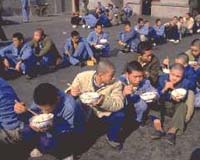 |
New Haven CT (SPX) Sep 15, 2009 A tiny bit of genetic material with no previously known function may hold the key to stopping the spread of cancer, researchers at Yale School of Medicine and Sichuan University in Chengdu, China report in two papers in the September 7-11 issue of Proceedings of the National Academy of Sciences. In the papers, Alan Garen of the Department of Molecular Biophysics and Biochemistry at Yale and his colleague Xu Song explain how cancer may overcome an organism's natural "stop sign" for cell division. During early development, stem cells give rise to other cells that differentiate into all types of tissue. New cell division and proliferation stop as the organism matures. However, cancer can hijack this process and trigger the uncontrolled cell division that produces cancer tumors. One mechanism that stops cell proliferation is a family of tumor-suppressor proteins (TSP) that bind to and block the function of proto-oncogenes, or genes that have the potential to trigger cancer. Garen's team working with mice found that an RNA molecule from an area of the genome that does not produce proteins prevents a type of TSP from inactivating these incipient cancer genes. The TSP protein they studied, called PSF, is virtually identical in mice and humans, he said. The Yale team succeeded in preventing the formation of tumors in mice by either increasing the amount of PSF or decreasing the amount of the non-coding RNA in a cell. "The tumor cell stops proliferating and the tumor regresses in a mouse model of cancer, suggesting that both procedures could be the basis of a clinical protocol," Garen said. Garen and his colleagues plan to continue their studies on the mechanism that regulates the amount of PSF-binding RNA in a cell, which they believe is central to the origins of cancer. The other authors on the papers are Ling Li, Gang Wang, Tingting Feng, Ying Cui, Yingying Lian, and Guangfeng Zhang, and Xu Song, who are in the laboratory established by Xu Song at Sichuan University in China after he left Yale. Share This Article With Planet Earth
Related Links Yale University Hospital and Medical News at InternDaily.com
 Most China transplants come from executed prisoners: state media
Most China transplants come from executed prisoners: state mediaBeijing (AFP) Aug 26, 2009 More than 65 percent of all transplanted organs in China come from executed prisoners, a situation that a senior health official has condemned as improper, state media reported Wednesday. The report in the English-language China Daily, which attributed the figure to health experts, was a rare acknowledgement of the role played by death row prisoners in the country's transplant industry. ... read more |
|
| The content herein, unless otherwise known to be public domain, are Copyright 1995-2009 - SpaceDaily. AFP and UPI Wire Stories are copyright Agence France-Presse and United Press International. ESA Portal Reports are copyright European Space Agency. All NASA sourced material is public domain. Additional copyrights may apply in whole or part to other bona fide parties. Advertising does not imply endorsement,agreement or approval of any opinions, statements or information provided by SpaceDaily on any Web page published or hosted by SpaceDaily. Privacy Statement |